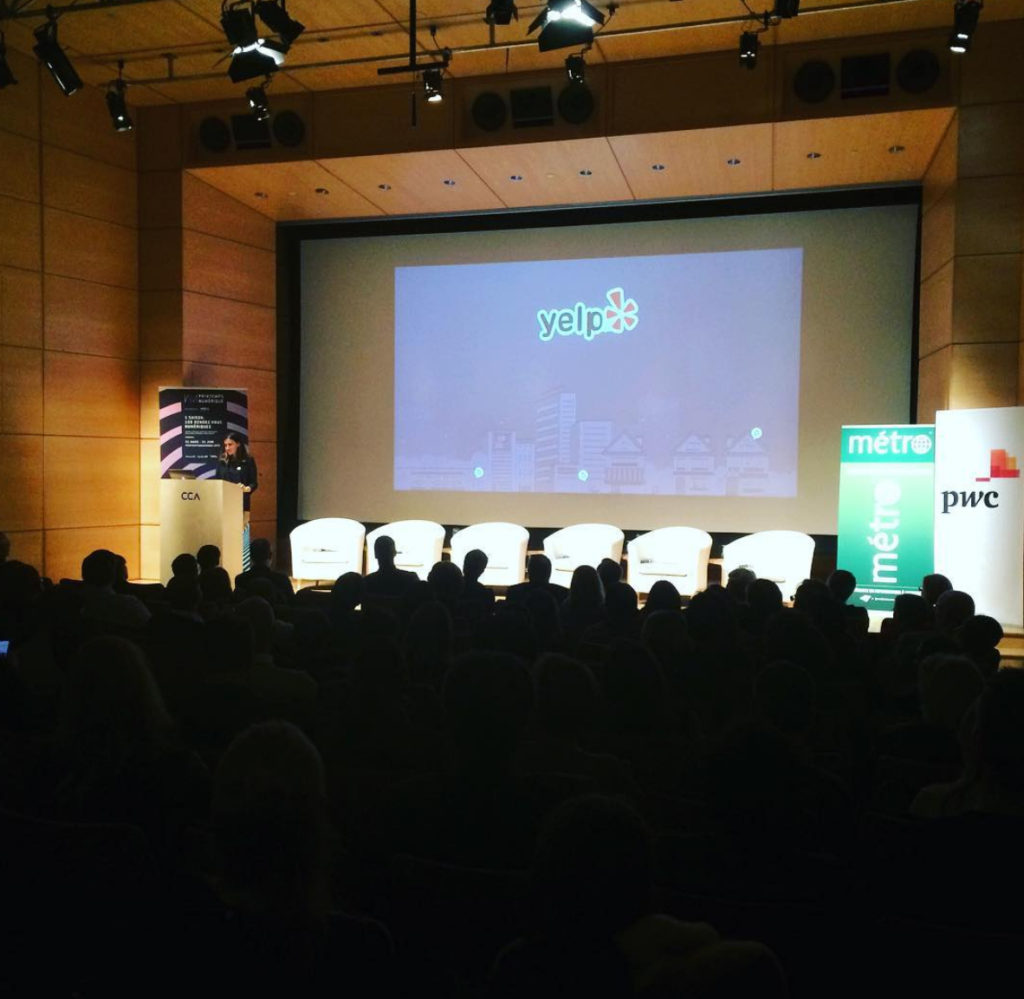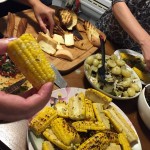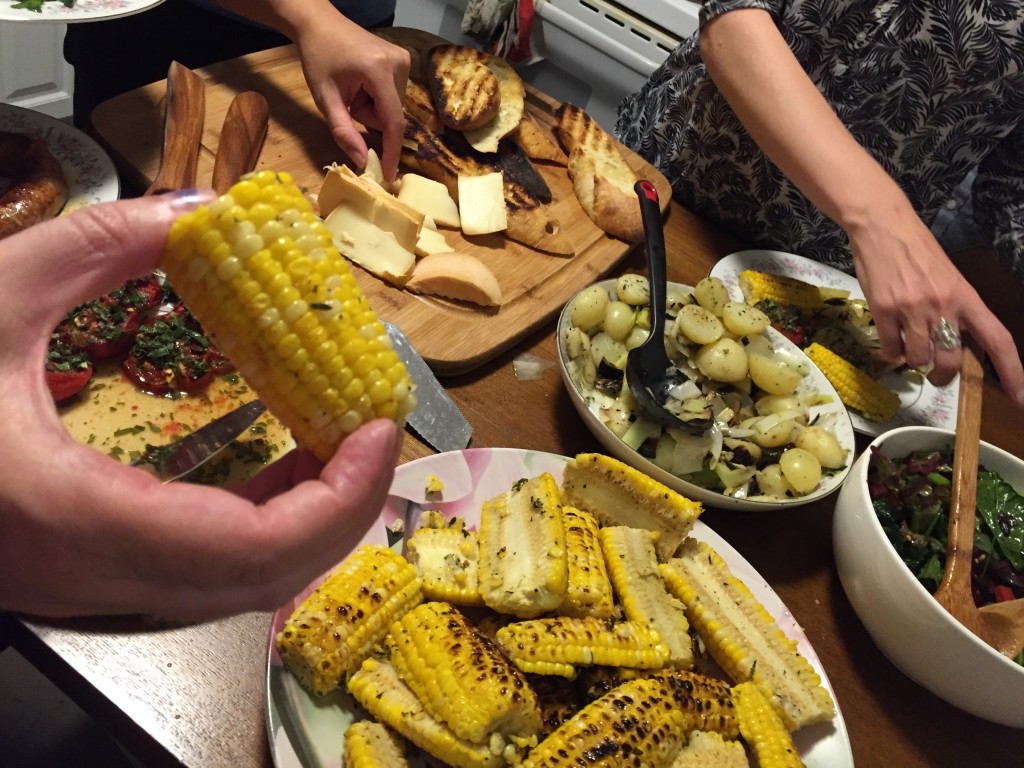Below is the event description, full text (in French) and slides for my presentation at the first #Intersections. I was thrilled but nervous to be included: it was my first time giving a presentation at this level entirely in my second language, and I had written my talk from a deeply emotional place following the US elections. But after the talk I had some really inspiring conversations with leaders in Montreal who are moved to use their positions and their know-how to create digital and community links aimed at the greatest challenges we face. So let’s keep our hopes held high, keep reaching for each other, caring for each other, facing our fears, and building systems that reflect our values. It’s all we can do, and it’s everything.
Le Printemps numérique vous invite le mardi 29 novembre au Centre Canadien d’Architecture / Canadian Centre for Architecture (CCA) pour la première édition de sa nouvelle série de 5 à 9 : #intersections / transformations numériques. → intersectionsmtl.com
Montréal ville à l’honneur : Dans le cadre de cette première édition dédiée à la ville et au numérique, panélistes et participants sont invités à échanger sur la façon dont le numérique transforme nos villes, nos réalités urbaines et nos rapports aux autres. Le panel rassemblera 5 experts montréalais:
► Patrick Gagné, Associé et Chef de produit, Taxelco / Téo Taxi
► Stéphane Goyette, Directeur du Bureau de la ville intelligente et numérique, Montréal, intelligente et numérique
► Albert Dang-Vu, Président directeur général, Mirego
► Risa Dickens, Directrice de marketing et de communauté sénior, Yelp
► Jean Bérubé, Directeur du développement, Montréal en Histoires.
La discussion sera animée par Marika Laforest, Chargée de projet pour Plan culturel numérique et Lab culturel à Culture pour tous.
Pour être honnête, je me débattais sur ce que je pouvais contribuer aujourd’hui. Je travail du côté de l’engagement communautaire avec des plateformes numériques – donc ma perspective n’est pas celle d’un ingénieur ou urbaniste.
Mais la chose la plus difficile pour moi c’est jours-ci c’est le climat politique dans lequel nous nous retrouvons suivant l’élection américaine. Quand le racisme, le sexisme et l’anti-environnementalisme prennent place au pouvoir, il me semble essentiel de se recentrer, se questionner, pour s’assurer que le travail que nous faisons s’enligne avec nos valeurs.
La journée suivant l’élection, le PDG de Yelp, Jeremy Stoppleman, nous a envoyé un courriel qui disait en partie:
Nous ne pouvons pas permettre à la rhétorique politique de taire notre voix ou de vaciller notre confiance…Tous les jours, nous aidons des millions de consommateurs à connecter avec les “autres”, à qui ils n’auraient pas nécessairement confié leurs santé, leurs maisons et leurs estomacs. Bien que nous ne pouvons réaligner le pays ou le relever de son angoisse du jour au lendemain, nous pouvons encore construire des liens humains positifs à travers Yelp – un par un, personne à personne.
Pour moi, ceci est l’essence de ce qu’on fait chez Yelp, et que je crois dirige les projets ayant le plus d’impact sur une ville numérique. Bâtir la confiance, les nouvelles connaissances, bâtir des relations, bâtir la compréhension.
Les projets “villes numeriques” ou “intelligentes” ne parviennent ni à capter l’imagination du public ni à avoir un impact positif et durable lorsqu’ils se résument à la collecte de données de surveillance, et ainsi accroître la segmentation et la division des villes.
Ce qui compte le plus pour moi c’est quand le numérique nous attire dans le réel d’une nouvelle manière. Ou, selon le point de vue de Yelp, quand les interactions numériques peuvent nous attirer vers des nouvelles parties de la ville, dans de nouveaux coins jamais visités, aux portes de petits commerces ou des humains, comme nous, travaillent d’arrache pied, non seulement pour gagner leur pain, mais pour rassembler les gens autour d’un festin inventée par leurs parents, leurs grands parents.
Quand j’ai commencé avec Yelp il y a 5 ans on venait de dépasser 20 millions d’avis. Cette année, nous avons atteint 115 millions. 80% des clients qui utilisent Yelp pour chercher un commerce effectuent un achat, guidé par cette recherche, dans la même semaine. Une étude réalisée par Le Boston Consulting Group a révélé qu’une entreprise qui revendique sa page Yelp d’entreprise gratuite a, en moyenne, vu son revenu augmenter de 8000$.
Une caractéristique moins connue mais essentielle à la croissance de Yelp en Amérique du nord a été le programme de gestionnaires de communauté. Sois à temps partiel ou à temps plein, des employés des quatre coins de l’amérique du nord sont charger de créer des nouveau liens dans leurs villes.
Les gestionnaires de communautés de Yelp commanditent les festivals locaux – nous sommes heureux d’être partenaires avec Roller Derby de Montréal, MTL a Table, Fierté MTL… la liste est longue. Nous mettons en vedette ces partenaires et des commerces locaux dans notre bulletin électronique et à travers des médias sociaux.
Aussi, nous organisons mensuellement des événements pour rassembler notre communauté hors ligne. Tout ça pour dire: nous explorons nos villes ensemble.
J’organise ça localement, avec l’aide de Mariko et Géraldine, alors venez nous saluer et nous trouverons ensemble des moyens d’amplifier ce travail de connection en ligne et hors ligne.
En terminant, j’aimerais partager 2 projets Data de Yelp auxquels je suis particulièrement intéressé pour leur impact sur la communauté. Ensuite je ferai une petite annonce à propos d’une compétition locale que nous organiserons ici en 2017, et finalement je vous conterai une petite histoire personnelle et un peu embarrassante… just to keep it interesting.
Donc premièrement, les projets de data: Il y a quelques années, Yelp a travaillé en partenariat avec le gouvernement des États-Unis pour lancer LIVES open data standard – une nouvelle norme de data ouvertes. Maintenant, des millions de consommateurs trouvent les points d’inspection des restaurants lorsque cette information est pertinente: lors d’une décision dans le choix de restaurant. Des études démontre que la mise en évidence de ces informations a un impact positif – les entreprises et les clients les utilisent pour faire des choix plus sains. I would love to see more Canadian cities adopt this standard.
Yelp a aussi collaboré avec ProPublica pour intégrer les statistiques sur les soins de santé sur les pages Yelp des établissement médicaux. C’est en faisant un survol des pages d’entreprises de milliers d’hôpitaux, de foyers pour personnes âgées et de cliniques de dialyse que s’expliquent les statistiques, notamment le temps d’attente dans les salles d’urgence…Avec ça, les millions d’utilisateurs de Yelp ont plus d’information quand il sont au milieu des décisions les plus critiques de leurs vies.
Je suis super inspirée par ce qu’on peut faire prochainement avec la base de données et la communaute d’utilisateurs de Yelp.
Depuis 2 ans, j’organise le seul hackathon de Yelp basé dans la communauté, et c’est ici à Montréal. Cette année, à partir du mois d’avril, nous allons mettre en vedette les meilleures applications locales. Nous inviterons les projets montréalaises d’intégré le API Yelp et à partager leurs innovations en ligne. Le public votera et les favoris seront célébré au gala Yelp le 8 juin au musée McCord.
Donc, c’était ça mon annonce et voici ma dernière histoire à propos du monde numérique et de la ville. Comme plusieurs montréalais, j’ai vécu ici la majeure partie de ma vie sans avoir un médecin de famille. J’ai appelé d’innombrables endroits, mis mon nom sur plusieurs listes- en ligne, dans le système créé pour ca – et j’avais l’impression de crier dans le vide. Le sentiment de ne pas parvenir à prendre soin de soi-même peut vraiment nous rentrer dedans. Donc, j’ai fait ce que tout être raisonnable, presque Milléniaux, ferait, j’ai publié un appel à l’aide sur Facebook. J’ai reçu près d’une trentaine de commentaires inutiles, ainsi qu’un message très inattendu d’un gars que j’avais rencontré via Ok Cupid il y a genre 5 ans. Après 5 ans de silence, ce rendez-vous OkCupid m’a présenté à une jeune femme super cool, qui est devenue ma médecin de famille.
Je vous conte tout ça parce que j’aime bien rendre les choses personnelles et inconfortables. Non, je vous raconte cette experience parce qu’il m’a été essentiel dans mon travaille de me rappeler que la communauté est agnostique des platformes.
La vie et la connection en ligne est comme la vie en forêt, il trouve un chemin. Et si nous construisons des systèmes qui ne correspondent pas aux chemins naturels et diversifiés de la vie, alors la vie va tout simplement contourner les systèmes que nous avons bâti en les laissant vides.
Les gens se retrouveront: sur Ok Cupid, dans des groupes Facebook, dans les sous-sols d’églises. Les systèmes qu’on créeit reflètent le caractère de la culture qui les constitue: si nous construisons des systèmes d’une maniere ouverts et réactifs; axés sur les valeurs; visant à rompre l’isolement, à mettre fin à la pauvreté; des systèmes suffisamment flexibles pour écouter et s’adapter aux endroits où les gens sont réellement, à qui ils sont réellement; les endroits de rencontre entre la ville et la numérique vont etre vibrant et plein de vie.
Merci.


















